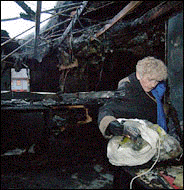November
25, 2003
Vow
to Rebuild Burned Holocaust Museum
By JO
NAPOLITANO
ERRE HAUTE, Ind.,
Nov. 22 -- An Auschwitz survivor has vowed to rebuild a
Holocaust museum here that was destroyed by a suspicious
fire early last Tuesday.
"We'll at least
open as good as it was before, but I think it will be
even better," said the owner, Eva Mozes Kor. "Even if it
takes the last pennies in my account, it will
open."
|

|
1
|
Eva
Mozes Kor
in the ruins of the museum she built to preserve
the memory of child Holocaust
survivors.
|
The Federal Bureau of Investigation is investigating the
case as domestic terrorism and a possible hate crime
because "Remember Timmy McVeigh" was found scrawled on a
wall of the museum, said Doug Garrison, spokesman for the
bureau's Indianapolis office.
Timothy J. McVeigh,
executed in Terre Haute in 2001 for his involvement in
the Oklahoma City bombing, was "the quintessential
domestic terrorist," Mr. Garrison said.
The Anti-Defamation
League is offering $2,500 for information leading to the
arrest and conviction of those responsible. "Without a
doubt, we view this as a hate crime," Richard Hirschhaut,
the league's Midwest director, said. "We believe this was
a deliberate act of hate and those who committed it were
hellbent on destroying a place of enlightenment and
virtue."
On Saturday, Ms.
Kor, a 69-year-old twin who was used in a number of
painful experiments by the notorious Dr. Josef Mengele,
sifted through the blackened remains of the museum, which
honors children who survived the Holocaust. Most of the
memorabilia were ruined. Hundreds of copies of Ms. Kor's
book, "Echoes From Auschwitz," were charred and soggy,
but she did recover a gift from schoolchildren who had
visited the museum: an angel holding a banner that read
"Peace."
Ms. Kor, who bears
a blurred number A-7063 on her arm, said she had forgiven
the Nazis and her next task was to forgive those who had
destroyed the tiny museum. "I am working on it," she
said. "As long as I am holding on to that pain, I am not
free from it."
Since the museum
opened eight years ago, roughly 5,000 people a year have
visited the 3,600-square-foot site, called Candles
(Children of Auschwitz-Nazi's Deadly Lab Experiments
Survivors).
When Ms. Kor
learned of the fire, she said her first thought was, Why
me? "But immediately after that," she said, "I thought I
have only two choices when I see anything tragic: be
destroyed by it or rise above it."
Two vigils have
been held in her honor, and supporters have sent a few
thousand dollars by mail.
Mark Potok, a
spokesman for the Southern Poverty Law Center, which
monitors hate groups, said 12 such groups were active in
Indiana. "Hard-line sympathizers of mass murderers like
Tim McVeigh are very much alive and well in this
country," Mr. Potok said. "With all of this attention
paid to foreign terrorism post-9/11, people tend to have
forgotten that there is a real subculture of people in
this country who believe that Jews need killing and who
see Tim McVeigh as having entered the pantheon of great
Aryan heroes."
Ms. Kor, who is
from Transylvania, was deported with her family to
Auschwitz in 1944. Her mother, father and two of her
sisters died there.
But Ms. Kor and her
twin sister, Miriam, survived and were subjected to
painful tests and experiments performed by
Dr. Mengele for nearly a year. Ms. Kor recalls
sitting naked, arms tied to a bench, for six to eight
hours while every part of her body was examined, measured
and compared with charts in lengthy, demeaning
observations several times a week. She said both she and
her sister had suffered life-threatening illnesses as a
result of Dr. Mengele's experiments.
"We were his guinea
pigs," she said, adding that he came in every morning to
count his test subjects.
Ms. Kor established
the museum to help bring attention to the child survivors
of the Holocaust, especially those who endured Dr.
Mengele's experiments.
Now, as her museum
sits in ruins, display cases destroyed, electronic
equipment melted, posters covered in a layer of soot, Ms.
Kor is hopeful. The arsonist, she said, was not entirely
successful.
"As strange as it
might sound, the world has learned about our little
museum," she said. "If he was trying to destroy
themessage we were trying to teach, he has accomplished
exactly the opposite."

